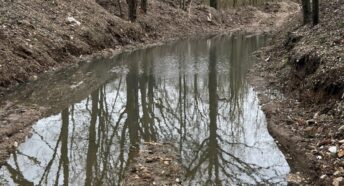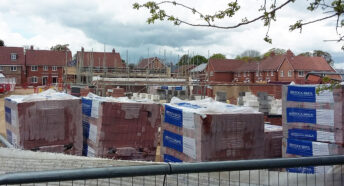Court of Appeal decision on Pond Farm highlights importance of air quality in planning policy

The Court of Appeal has rejected an attempt by Gladman Developments Ltd to overturn the refusal of permission to build up to 330 homes and an ‘Extra Care’ facility at Pond Farm, Newington, near Sittingbourne.
The proposals were refused by a planning inspector and again by a High Court judge in 2017. Gladman took that decision to the Court of Appeal, where the decisions of the inspector and the High Court were upheld in a judgment handed down yesterday (September 12, 2019).
CPRE Kent challenged the proposals as it was clear homes built in this location would be heavily dependent on car-based transport, and that building in this area would only worsen already unacceptable levels of air pollution along the A2 at Newington and Rainham.
At the planning inquiry, Gladman argued that it had offered a financial contribution to undertake measures that would limit the effects of its development on air quality.
However, CPRE Kent’s air-quality witness, Professor Stephen Peckham, argued there was no indication of how that contribution would be spent, nor any evidence provided that those measures would actually limit the use of petrol or diesel vehicles and in doing so reduce NO2 emissions.
In refusing permission, the inspector agreed that air quality and human health would suffer if this development were to go ahead.
Hilary Newport, director at CPRE Kent, said: “This important decision serves to underline that government simply must commit to its obligations on air quality.
“We simply cannot continue to allow ‘business as usual’ planning decisions that ignore the impact of unsustainable transport on the health and well-being of communities.
“We must act quickly to bring about significant changes in the way we plan for future homes, employment and travel needs.”
Richard Knox-Johnston, vice-president of CPRE Kent, said: “We believe that winning this planning appeal represents the first time air-quality mitigation leading to health concerns has been given as a reason.
“CPRE Kent used air quality in this case even though the local planning authority did not object.
“In having this precedent tested in the High Court and subsequently in the Court of Appeal it has been shown that air-quality mitigation must now be taken into consideration in any planning application.
“My thanks go to Professor Stephen Peckham for his expert advice without which we would not have been able to put our case.”
CPRE Kent also wishes to thank the legal teams at Cornerstone Barristers and Richard Buxton Solicitors for their hard work and expertise.
You can read the Court of Appeal judgement here:
- A number of important documents have yet to emerge. For example, a rigorous transport plan and a finalised air-quality assessment. The latter is critical given that allocations at Teynham will feed extra traffic into AQMAs.
- There seems to be no coherent plan for infrastructure delivery – a key component of the plan given the allocations being proposed near the already crowded Junction 7.
- There seems to have been little or no cooperation with neighbouring boroughs or even parish councils within Swale itself.
The removal of a second consultation might have been understandable if this final version of the plan were similar to that being talked about at the beginning of the consultation process. It is, however, radically different in the following ways:
- There has been a major shift in the balance of housing allocations, away from the west of the borough over to the east, especially around the historic town of Faversham. This is a move that raises many concerns.
- A new large allocation, with accompanying A2 bypass, has appeared around Teynham and Lynsted, to which we are objecting.
- Housing allocations in the AONB around Neames Forstal that were judged “unsuitable” by the council’s own officers have now appeared as part of the housing numbers.
- Most of the housing allocations being proposed are on greenfield sites, many of them on Grade 1 agricultural land – a point to which we are strongly objecting.
Concerns about the rush to submit the plan
The haste with which the plan is being prepared is especially worrying given the concentration of housing in Faversham. If the town is to take a large amount of new housing, it is imperative that the policies concerning the area are carefully worked out to preserve, as far as possible, the unique nature of the town. The rush to submit the plan is likely to prove detrimental.
As Swale does not have a five-year land housing supply, it is open to speculative development proposals, many of which would run counter to the ideas contained in the current plan. Some are already appearing. This is a common situation, and one that, doubtless, is a reason behind Swale’s haste.
Our overriding fear, however, is that this emphasis on haste is ultimately going to prove counterproductive. This is because it is our view that the plan, in its current form, is unlikely to pass independent examination. We are urging Swale to listen to and act upon the comments being made about the plan and to return the plan to the council with appropriate modifications before submitting it to the Secretary of State.
Essentially, this means treating the current consultation not as the final one but as the ‘lost’ second consultation.
The consultation ends on Friday 30 April and we strongly urge residents to make their opinions known if they have not already done so.
Further information








